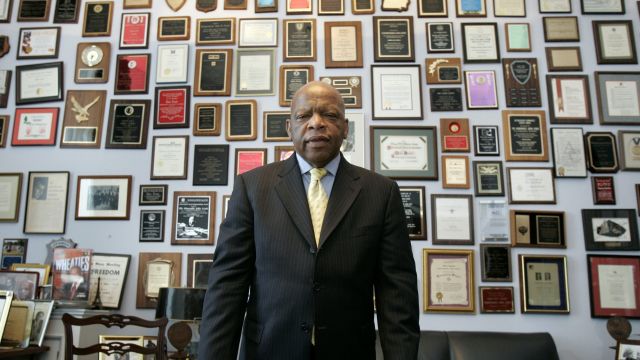House Speaker Nancy Pelosi confirmed Mr Lewis’s passing late on Friday night, calling the veteran politician “one of the greatest heroes of American history”.
Mr Lewis received tributes from both Democrats and Republicans when he announced in December that he had been diagnosed with advanced pancreatic cancer.
He was the youngest and last survivor of the Big Six civil rights activists, a group led by Martin Luther King Jr that had the greatest impact on the movement.
He was best known for leading some 600 protesters in the Bloody Sunday march across the Edmund Pettus Bridge in Selma.
At age 25 — walking at the head of the march with his hands tucked in the pockets of his tan overcoat — Mr Lewis was knocked to the ground and beaten by police.
His skull was fractured, and nationally televised images of the brutality forced the country’s attention on racial oppression in the South.
Within days, Reverend King led more marches in the state, and President Lyndon Johnson soon was pressing Congress to pass the Voting Rights Act.
The bill became law later that year, removing barriers that had barred black people from voting.
Mr Lewis turned to politics in 1981, when he was elected to the Atlanta City Council.
He won his seat in Congress in 1986 and spent much of his career in the minority.
After Democrats won control of the House in 2006, Mr Lewis became his party’s senior deputy whip, a behind-the-scenes leadership post in which he helped keep the party unified.
Mr Lewis said he had been arrested 40 times in the 1960s, five more as a congressman.
At 78, he told a rally he would do it again to help reunite immigrant families separated by the Trump government.
“There cannot be any peace in America until these young children are returned to their parents and set all of our people free,” Mr Lewis said in June, recalling the “good trouble” he got into protesting segregation as a young man.
“If we fail to do it, history will not be kind to us,” he shouted. “I will go to the border. I’ll get arrested again. If necessary, I’m prepared to go to jail.”
In a speech the day of the House impeachment vote of President Trump, Mr Lewis explained the importance of that vote.
“When you see something that is not right, not just, not fair, you have a moral obligation to say something, to do something. Our children and their children will ask us ‘what did you do? what did you say?’
“We have a mission and a mandate to be on the right side of history.”
Mr Lewis’s wife of four decades, Lillian Miles, died in 2012. They had one son, John Miles Lewis.







